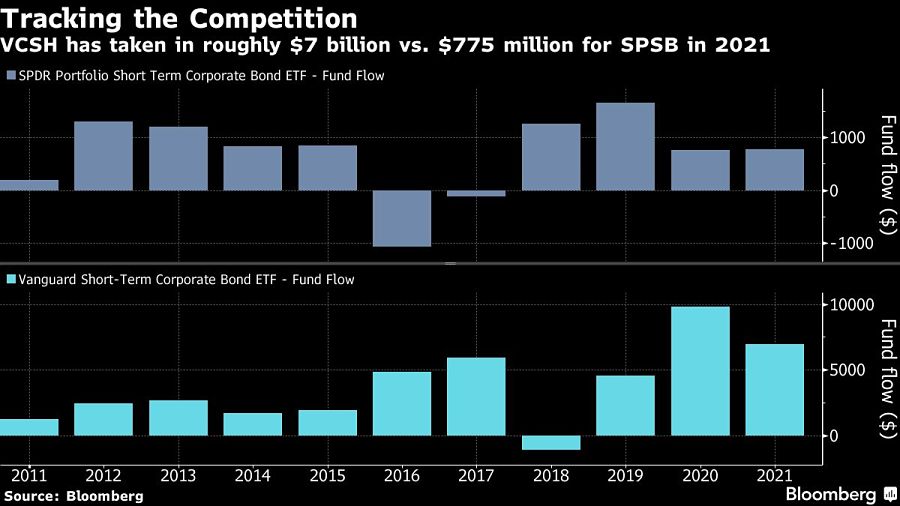

State Street Global Advisors is cutting fees on three corporate bond exchange-traded funds as it seeks to boost its share of the booming fixed-income ETF business.
The Boston-based issuer lowered the expense ratios to 0.04% from 0.07% for its short (SPSB), intermediate (SPIB) and long-term (SPLB) maturity focused corporate bond funds.
The reduction in fees is occurring as the use of such products is increasing among institutions, many of which have warmed to these types of ETFs following an embrace by the Federal Reserve, according to Bill Ahmuty, head of the SPDR fixed income group at State Street Global Advisors.
“A large catalyst coming out of the volatility of 2020 and Covid and this use of these funds in the Fed’s SMCCF program really helped as endorsements for fixed-income ETFs, and we continue to see an uptick in institutional usage, whether it’s insurance companies, asset managers,” and others, Ahmuty said in a phone interview, referring to the central bank’s Secondary Market Corporate Credit Facility, which was deployed to help support credit markets.

At one point last year, the Federal Reserve became one of the top holders in some of the world’s largest credit ETFs after it stepped into the market amid the coronavirus pandemic.
That’s helped push institutional players to see fixed-income ETFs as “a tool they can use,” Ahmuty said.
State Street’s move makes all three of those funds cheaper than similar products from competitors, including those from Vanguard, which charges 0.05% for its short (VCSH), intermediate (VCIT) and long-term (VCLT) corporate bond ETFs.
For comparison, VCSH has seen inflows of around $7 billion this year, data compiled by Bloomberg show, while State Street’s short-term product has taken in around $775 million in the same period. Investors have added almost $6.4 billion to Vanguard’s VCIT, while SPIB has seen an exodus of money so far in 2021.
That underscores how much more preferable one product can be over another in the eyes of large market participants. Ahmuty says State Street’s ETFs are now competitively priced and the company remains committed to reducing costs where possible.
As for the timing of the move, Ahmuty says that while equity markets are largely up this year, many fixed-income ETFs are lagging.
“So as we head into year-end, we see the opportunity for tax-loss harvesting with fixed-income ETFs,” he said. “A lot of folks always think of tax-loss harvesting as it relates to equity funds, but we see an opportunity here in fixed-income funds.”

Plus, a $400 million Commonwealth team departs to launch an independent family-run RIA in the East Bay area.

The collaboration will focus initially on strategies within collective investment trusts in DC plans, with plans to expand to other retirement-focused private investment solutions.

“I respectfully request that all recruiters for other BDs discontinue their efforts to contact me," writes Thomas Bartholomew.

Wealth tech veteran Aaron Klein speaks out against the "misery" of client meetings, why advisors' communication skills don't always help, and AI's potential to make bad meetings "100 times better."

The proposed $120 million settlement would close the book on a legal challenge alleging the Wall Street banks failed to disclose crucial conflicts of interest to investors.
Orion's Tom Wilson on delivering coordinated, high-touch service in a world where returns alone no longer set you apart.
Barely a decade old, registered index-linked annuities have quickly surged in popularity, thanks to their unique blend of protection and growth potential—an appealing option for investors looking to chart a steadier course through today's choppy market waters, says Myles Lambert, Brighthouse Financial.
